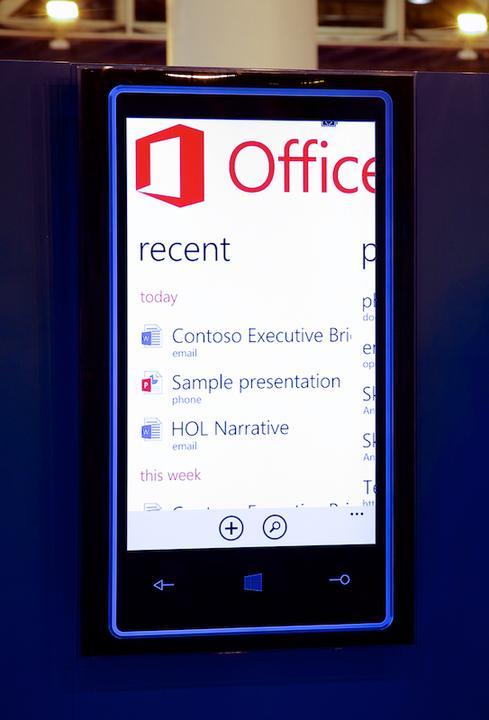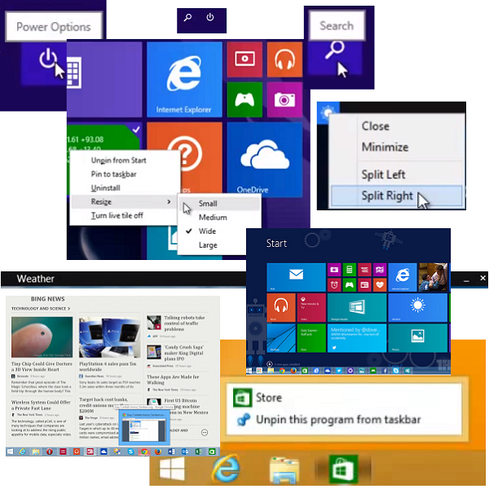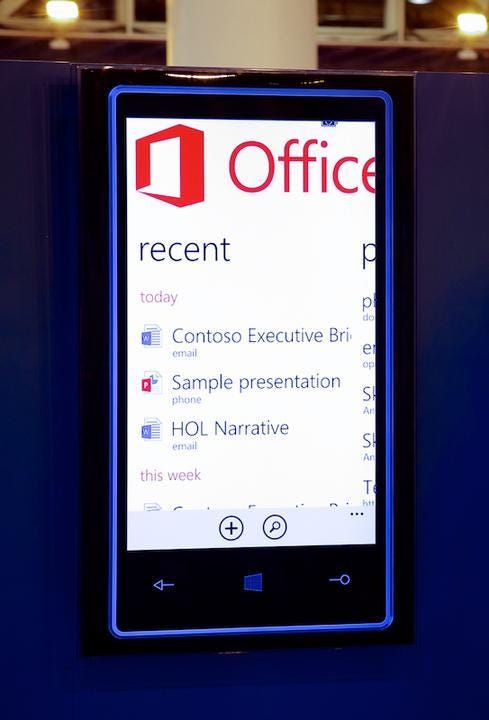Microsoft Office For iPad: 5 Big QuestionsMicrosoft Office For iPad: 5 Big Questions
Will the much-anticipated productivity suite, expected to be revealed Thursday, be a hit with customers? Watch these five factors.


Windows 8.1 Update 1: 10 Key Changes
Windows 8.1 Update 1: 10 Key Changes (Click image for larger view and slideshow.)
Microsoft CEO Satya Nadella on Thursday will deliver his first press presentation since taking the company reins. Officially, Microsoft has said only that the event will be "related to the intersection of cloud and mobile," but a variety of sources have claimed, citing anonymous insiders, that a native version of Office for iPads will finally debut.
By finally opening the world's most popular productivity suite to the world's most popular tablet, Microsoft likely stands to make billions. But given the company's size, resources, and industry stature, huge Office revenue streams are par for the course. Microsoft's greatest challenge isn't making money, but rather positioning Office to be as dominant in today's consumerized mobile landscape as it was during the PC's heyday.
[How big are iPads in the workplace? Read iPad Dominates Enterprise Tablet Market.]
What does Microsoft need to bring to the tablet to make Office for iPad a smash? Assuming the much-anticipated productivity suite appears this Thursday as expected, here are five things to watch.
1. Will Office for iPad be more than an oversized version of Office Mobile?
At least one report claims Office for iPads will resemble Office Mobile, which comes pre-installed on Windows Phone devices but requires an Office 365 subscription for full access on iPhones and Android handsets. The iPad is a superlative consumption device that can also handle light content creation, which puts pressure on Microsoft to find the right blend between Office's historical feature richness and iOS's intuitive, simple user experience. Office Mobile certainly hasn't hurt Office 365 sign-ups, which continue to grow among both businesses and consumers. But the lightweight mobile apps haven't driven growth so much as enhanced the larger Office 365 package, making it unclear whether Office for iPads will be a disruptive force, or merely an extension of ongoing momentum.
2. Will Office for iPad be available without an Office 365 subscription?
Earlier this month, Microsoft announced Office 365 Personal, an individual-oriented package that will provide full Office access on one PC and one tablet for $6.99 per month or $69.99 annually. Many perceived the upcoming subscription service as evidence that a native version of Office for iPads was imminent. As part of Office 365, Office for iPads will generate billions from corporate uptake alone; iPads are ubiquitous in the enterprise and many businesses are already embracing to Office 365, so Office for iPads can only sweeten what has already proved a tempting offer. But consumers have arguably driven iPad popularity more than businesses, and it's not clear how many average tablet users will sign up for individual Office 365 accounts. Will Microsoft also offer standalone versions of iPad Office apps? Will the apps include limited functionality, such as document review, for free? Given that Microsoft feels Office must become more social and collaborative, could standalone apps provide enough value, or will users need the cloud to enjoy the biggest benefits?
Figure 1:  Will Office for iPads be more than a larger version of Office Mobile?
Will Office for iPads be more than a larger version of Office Mobile?
3. Is it too late?
There are ostensibly two reasons Microsoft has taken this long to release Office for iPads: it's likely taken a lot of time and effort to translate the applications to a touch-first interface; and by limiting native Office access to Windows tablets, Microsoft hoped to secure an advantage over its mobile rivals.
But as Microsoft has dragged its feet, tablet users have grown accustomed to a variety of free alternatives. Given that tablet productivity is unlikely to fully replace mouse-and-keyboard productivity in the first place, it's unclear
how many iWork or Google Docs users will revert back to Office on their tablets, especially if subscription costs are involved. If the product offers clear benefits, that could be one thing. But if it's just a plus-size iteration of Office Mobile, the new product could fall at the lower end of revenue projections.
Still, Microsoft's recent release of OneNote for iOS appears to be a success. It is currently one of the most popular downloads in the app store and has generated better user feedback scores than Apple's own iWork titles. Could this success foreshadow higher-than-expected demand for iPad-optimized Office apps?
4. Will Office for iPads kill Windows tablets?
As mentioned, Microsoft has positioned native Office access as one of Windows tablets' primary advantages over rivals. Despite the tactic, Windows slates continue to sell modestly. With Windows tablets' Office advantage now removed, will we see slowing demand for devices such as the Surface?
Though Windows tablets offer native Office support, the devices only run the software in desktop mode, that is, it's basically a conventional Office experience with some touch controls layered on the top. Reports have claimed Microsoft will follow Office for iPads with new versions for Windows 8.1's Modern UI. Will these apps include features that aren't in the iPad version? Build, Microsoft's conference for developers, will take place in San Francisco during the first week of April. The company is expected to release a Windows 8.1 update and will face pressure to present an improved device strategy.
5. Is Satya Nadella asserting his authority as CEO?
As Microsoft fell further behind Apple and Google in the mobile race, now-retired CEO Steve Ballmer frequently endured criticism from investors and the press. His refusal to speak candidly about Office on iPads, let alone to release actual products, was a fixture in this criticism. As such, Nadella, by deciding to make Office for iPads his first high-profile move, can be seen as forging his own trail.
That said, reports have claimed over the last year that Microsoft's leadership has been hampered by behind-the-scenes squabbling. Notably, ValueAct, which owns a large stake in Microsoft and is thought to oppose to the company's consumer-oriented goals, recently succeeded in placing its president, Mason Morfit, on the Microsoft board. Until Nadella has a few appearances under his belt, it's difficult to say which decisions reflect his new authority, and which reflect changing dynamics among Microsoft leaders.
Engage with Oracle president Mark Hurd, NFL CIO Michelle McKenna-Doyle, General Motors CIO Randy Mott, Box founder Aaron Levie, UPMC CIO Dan Drawbaugh, GE Power CIO Jim Fowler, and other leaders of the Digital Business movement at the information Conference and Elite 100 Awards Ceremony, to be held in conjunction with Interop in Las Vegas, March 31 to April 1, 2014. See the full agenda here.
About the Author
You May Also Like






